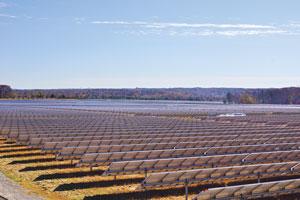
The very idea of climate change — aka global warming — and fossil fuels’ role in that alleged process boil the blood of non-believers, scientific evidence be darned!
It is hard to make a case against climate change, though, when we are all running around in shorts and sandals and painting our toenails summer red the week before Christmas. Even so, all I could think of when I read about the whoop-de-do surrounding tiny Woodland, North Carolina, over solar panels was “You really cannot make this stuff up!”
Woodland, a municipality of about 800 souls in Northampton County, an area North Carolinians refer to as “down East,” has just learned a brutal lesson in the realities of social media and the international reach of the Internet. Turns out it is not much fun to be the butt of jokes about country bumpkins, local yokels and Clampetts reincarnated. As best I can glean from news accounts, the situation is this.
Woodland, like many rural areas in our state, has embraced solar farming. The area remains rural poor and largely under educated. Solar farms are clean industries in an area that has few industries of any sort.
Woodland has already approved three solar farms encircling the town, one of which is close to completion. A fourth solar company applied to the town council earlier this month for one more farm, and as Gomer Pyle might say, “all heck broke loose.” Local residents expressed opposition to yet another solar project with such memorable points of view as solar panels “suck up all the energy from the sun.” A retired science teacher shared her worry about local plants, asserting that solar panels take so much sunlight, plants do not get enough and turn brown. She also noted the high number of cancer deaths in the area and shared that no one could convince her that solar panels do not cause cancer.
The Woodland Town Council voted not to rezone the property in question and imposed a moratorium on future solar projects, and the story went viral. A quick Google search confirms that lots of folks all over the world were having a good chuckle at Woodland’s expense.
Not so fast.
While members of the Flat Earth Society did speak, so did other local residents whose concerns seem more reasonable. They spoke of declining property values, young people with no job prospects since solar farming requires few employees and encroachment on residential areas. Such concerns are also heard beyond the confines of Woodland.
Interest in alternative energy sources including solar has been rising along with concern about the impact of fossil fuels on our environment. North Carolina has become a magnet for solar farms with our mostly sunny weather, flat rural areas with cheap farmland, especially when it is close to power grid connections. So popular are we that North Carolina is now fourth in the nation in solar output. Not everybody is happy about this development, as Woodland residents clearly expressed.
Objections in Woodland and elsewhere generally center on solar farms’ effects on property values and local economies and not so much on the safety of solar farming for both plants and animals, including human beings. Also concerning is the rapid transformation of North Carolina’s rural landscape from soybean and tobacco fields to acres of glowing blue solar panels wthat now dot our countryside. N.C. State University crop science professor Ron Heiniger was quoted in the News and Observer about the transformation of eastern North Carolina in particular. Says Heiniger, it “may well be one of the most important agricultural issues of our generation.” He goes on to say that solar farming could become so widespread that some traditionally agricultural land may never be farmed again.
There is a lot going on here.
Economic angst about land values and the morphing of traditional industries into who knows what. Agricultural lifestyles that no longer support and sustain generations of families. Rural and urban. Young people seeking a living and the people who want them to stay home. Quality education in the 21st century. Tradition and technology in a world that now moves with lightning speed.
After the vote and the mocking of Woodland on social media, town officials scrambled to explain what had occurred. Mark Lane, a town council member, took pains to explain the town’s position. “We’re not opposed to the solar farm itself. We wanted to make sure they didn’t overtake the town.”
Lane’s statement rings true.
As for your columnist, I am pondering whether I will wear a gauzy cotton dress or a snugly wool sweater to Christmas dinner. Happy holidays to all, including the folks in Woodland!

 How to resolve AdBlock issue?
How to resolve AdBlock issue? 








